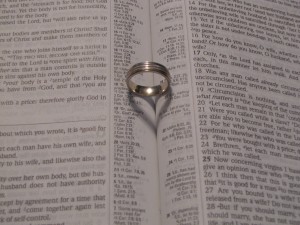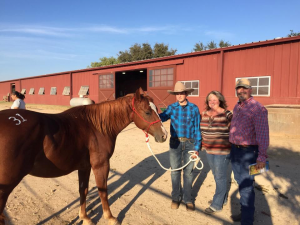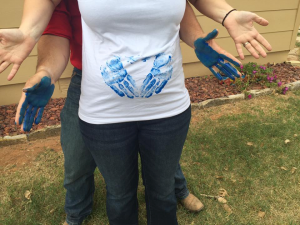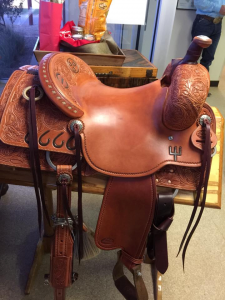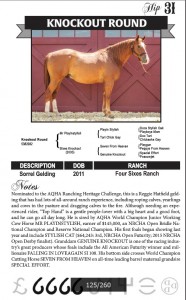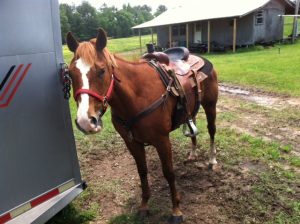
Our 5-year-old AQHA gelding
This is a picture of Knockout, my 6-yo AQHA gelding.
Knockout is my horse.
He is my horse because I bought and paid for him. Just as importantly, he is my horse because he has chosen to trust me and I have committed to train him.
What does it mean to be my horse? It means he is different from other horses. He behaves very differently from a wild untamed horse, especially when I’m near.
When I approach Knockout in the pasture, he steps toward me rather than fleeing. He lets me halter and lead him wherever I want him to go. Knockout stands still while I groom and saddle him. He loves treats, belly rubs, and soothing talk! He lets me ride on his back and agrees to carry me wherever I ask. We have worked out a nonverbal system of communication that allows me to tell Knockout what direction I want him to go at what speed…and he responds to my ask. He has good manners, respects my personal space, backs or advances on a light touch, trailers well, and stands for the farrier.
Knockout and I have developed a relationship based on mutual respect and mutual trust. He is my horse and I am his master. And I’m pretty proud of him! 🙂
Our relationship wasn’t always as trusting as it is now. He had some previous bad experiences with humans and wasn’t very trusting. We’ve both had insecurities to overcome. The first time I rode Knockout, he tried to bolt then bucked me off when I checked him. We’ve gone through phases where he acted like he didn’t want anything to do with me. And we’ve gone through phases where I wasn’t sure I could ever learn to trust him or earn his trust.
But even then, he was my horse…because I bought and paid for him…and because he chose to be willing to learn to trust me.
The more time we spend together, the more he acts like my horse. Over time, his behavior has changed to make it obvious he is my partner, not just some wild horse running around our pasture.
Now, those changes have required work…and they are still ongoing. He’s still far from finished out. But we’ve come a long ways from where we started. He acts more like he belongs to me today than he did a year ago…and a year from now he’ll act even more like he belongs to me.
This training and learning is hard work for both of us. Knockout consistently shows up ready to work and ready to give me his best effort. If he wasn’t willing to work so hard, we could not have progressed as well as we have.
However, Knockout is completely incapable of learning to become a saddle horse through his own effort.
Suppose I had told him on the first day, “Knockout I want you to learn to be a saddle horse, and I need you to study and work real hard at it. Some of those other horses in your pasture are trained saddle horses, and I want you to watch them and do what they do. Work hard and learn how you must behave to truly be my horse.”
How do you think that would have worked out? Not too well, right? No amount of his watching the other horses or running around the pasture trying to learn reining skills would have taken him even one step closer to the goal. He would never have managed to gain even the foggiest notion of what he was supposed to be doing.
See, Knockout is really only responsible for being willing to learn to trust me. The rest is up to me.
Knockout has absolutely no idea what he needs to learn. It is up to me to teach him in a way he can learn to understand.
I challenge him a lot! I take him places he has never been. I ask him to go places he’s uncomfortable going. I ask him to learn to do new things, then I ask him to do those things better and faster.
I ask a lot of Knockout and he gives me a lot. But the end result is up to me. He’s not responsible for learning to become a finished out saddle horse. That’s my responsibility. His only responsibility is to be willing to trust me…to learn to pay attention to me…to learn to respond to my cues. The rest is up to me.
Knockout is a really smart horse, and sometimes he tries to anticipate what he thinks I want him to do before I ask. That generally does not work out well. I don’t want him to work for me. I want him to work with me…in response to my cues. I don’t need him to work hard at becoming the horse I want him to be. He just needs to be willing to trust me and pay attention to me…the rest is up to me.
As a Christian, it is easy to start thinking my job is to go out and work for Christ…or to wage war against sin…or to study hard to become more Christ-like…to make my calling and election sure by becoming more righteous. And certainly a healthy Christian life does include plenty of hard work, study, effort, and self-discipline.
But the thing is, I am no more capable of making myself a child of God than Knockout is of making himself a finished out saddle horse. No amount of effort on my part can move me one inch closer to godliness…unless that effort is directed by the Holy Spirit.
No amount of effort on my part can move me one inch closer to godliness. Click To TweetJesus already bought and paid for me. I have already chosen to place my trust in Him. I am His and He is mine. Sometimes I don’t act much like I belong to Him…but I act more like His now than I did previously…and I will learn to act more like His than I do now…as I spend time with Him…as I abide in Him…as I rest in Him.
We tend to fall into the trap of dual-phase thinking…of thinking we must choose one of two paths…of choosing between apathy and hard work and believing hard work is the godly choice. Viewed from this perspective, we are concerned about folks we see who claim to be Christians yet show no fruit in their lives…and we wonder do they really belong to Christ? So, in an effort to ensure we don’t make the same mistake, we resolve to work hard to become more godly.
But the dual-phase paradigm completely misses the reality of being conformed to the image of Christ by simply resting in Him…and this is the only way to become godly.
Resting in Christ is not a passive apathetic rest. It is an attentive intentional rest. It is staying focused on Him ready to respond to His cue, while trusting Him completely with the results.
Knockout cannot become a finished out saddle horse by just running around the pasture as though I did not exist. Neither could he make any progress on his own through hard work and determination. Rather, he must simply trust me…and leave the rest up to me.
Likewise, my job is to simply trust God and spend time with him…to seek His will and learn to know His voice…to learn to respond to His cues. The rest is up to Him. He has promised to complete the good work He has begun in me. He has promised to conform me to His image. He has already redeemed me from sin and He promises to also deliver me from sin. He has promised to bring about in my life the destiny which He predestined for me before the foundations of the world.
He is faithful! And I can trust Him.
I am His…and He is mine!
Your thoughts?

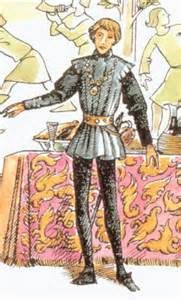 Prince Rilian of Narnia was a man with two destinies.
Prince Rilian of Narnia was a man with two destinies.
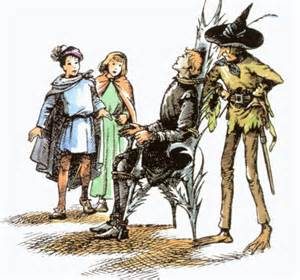 What about The Silver Chair from whence the book derives its name?
What about The Silver Chair from whence the book derives its name?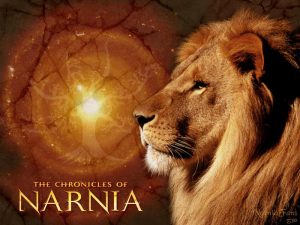 In rereading C.S. Lewis’ The Chronicles of Narnia, I’ve been fascinated by Lewis’ portrayal of how Aslan’s will is worked out in Narnia.
In rereading C.S. Lewis’ The Chronicles of Narnia, I’ve been fascinated by Lewis’ portrayal of how Aslan’s will is worked out in Narnia.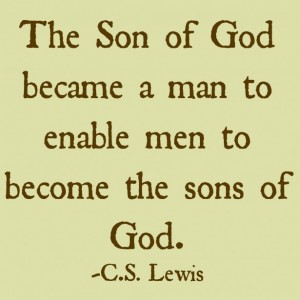 Does God change?
Does God change?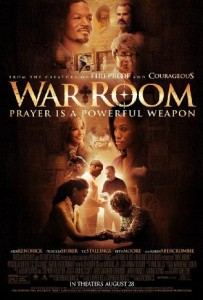 My wife and I have been hearing about the movie War Room for months and finally made time to watch it together, this past weekend.
My wife and I have been hearing about the movie War Room for months and finally made time to watch it together, this past weekend.